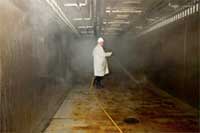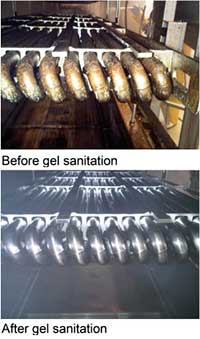Outsourcing of Your Cleaning Program
By David Howitt
In an effort to meet consumers’ demands for cleaner and safer food preparation environments, more companies are turning to professional cleaning services to get the job done.
 When it comes to food safety, North American consumers are demanding more and better safeguards. Food safety products are expected to increase substantially over the next four years as the public becomes more aware of issues surrounding food sanitation and government regulations become tighter.
When it comes to food safety, North American consumers are demanding more and better safeguards. Food safety products are expected to increase substantially over the next four years as the public becomes more aware of issues surrounding food sanitation and government regulations become tighter.
Because of this increased scrutiny, many restaurants, food processing plants, and other businesses are turning to professional cleaning companies for outsourced food sanitation. There are a number of professional cleaning companies whose specialty offers a robust sanitation program to help businesses improve their food safety practices that decrease the risk of contamination.
Maintaining a Clean Environment for Food Safety
Most businesses that handle food are required to implement a Hazard Analysis & Critical Control Points (HACCP) plan and sanitation program to ensure that the production process is safe throughout the facility, not just at a the point of consumption. HACCP plans help companies recognize key points where the risk of contamination is highest, ensuring steps for processes are in place to reduce or eliminate those risks.
Any sanitation program has two major components: a sanitation procedure and an operating system. A robust sanitation program must include these two components to ensure a food processor maintains a safe food processing facility.
Key Sanitation Procedures
- Specific KPIs (Key Performance Indicators) and determine audit responsibilities and outcomes
- Review of Risk Assessments & Work Instruction Sheets (WIS)
- WIS (SSOPs) include all required materials and equipment for cleaning, required quality end result
- Pictures before and after, step by step procedure to complete the work activity, safety and operational concerns, and cleaning frequency
- Inclusion of care points (critical care elements) & inspection points on WISs
- Training for all members to increase versatility, labour flexibility, & responsiveness
Operating System Verification and Validation
- Documented risk assessments and standard operations
- Training programs, records, and versatility charts
- Corrective & preventative action reports (inc 8D/5 Whys)
- Layered (and documented) audit trail processes giving greater degrees of “traceability” and accountability
- Authorised buy-off procedure
Outsourcing your Facilities’ Cleaning Can Reduce Food Events
Food sanitation processes can become complicated very quickly. Ensuring employees follow the exact sanitation procedures, every time, is a challenge. Worker complacency in relation to sanitization procedures can put your facility and company at risk for having a contamination event.
The primary reason that many food service establishments and processing plants are increasingly seeking ways to outsource their sanitation programs is the depth of expertise they can provide. Not only are their processes superior but often they will work with your team to implement a HACCP plan. Industrial cleaning companies like Team Solutions can assist food businesses increase efficiency, enhance productivity, and improve profitability. By providing support services for ongoing maintenance in one or more facilities, processors can remain focused on generating revenues while the experts ensure the environment is sanitized properly every time.
Food processing plants, in particular, account for a large part of this trend in outsourcing. As the public becomes better educated about the food production process, the industry is focusing on food safety as a primary concern. For that reason, many plant managers are outsourcing their sanitation to ensure quality food processing plant cleaning. This increased spotlight on food sanitation and maintaining proper protocol should mean safer food for consumers. Food handlers of all varieties are taking steps to ensure that the final product they deliver to consumers is safe for consumption.
About the Author
David Howitt, Business Development Manager, Food Division, Team Solutions http://www.teamcleaningsolutions.com
To have more articles like this emailed to your inbox, become a GFSR Member today!

-
 FeaturedRisk management
The Cost of a Breach: What a Cyberattack Could Mean for Food Safety Recalls
FeaturedRisk management
The Cost of a Breach: What a Cyberattack Could Mean for Food Safety Recalls
-
 FeaturedRisk management
Securing the Food Chain: How ISO/IEC 27001 Strengthens Cybersecurity
FeaturedRisk management
Securing the Food Chain: How ISO/IEC 27001 Strengthens Cybersecurity
-
 FeaturedRisk management
Revolutionizing Food Safety Training: Breaking Out of the “Check-the-Box” Mentality
FeaturedRisk management
Revolutionizing Food Safety Training: Breaking Out of the “Check-the-Box” Mentality
-
 GFSI Standards
GFSI 2025: Building Trust, Tech-Forward Solutions, and Global Unity in Food Safety
GFSI Standards
GFSI 2025: Building Trust, Tech-Forward Solutions, and Global Unity in Food Safety
-
 FeaturedFood Safety
Integrated Pest Management: Strategies to Protect Your Brand’s Reputation
FeaturedFood Safety
Integrated Pest Management: Strategies to Protect Your Brand’s Reputation
-
 FeaturedFood Safety Culture & Training
No Open Door Policy: Challenges That Impact Pest Control in Food Processing Plants
FeaturedFood Safety Culture & Training
No Open Door Policy: Challenges That Impact Pest Control in Food Processing Plants



